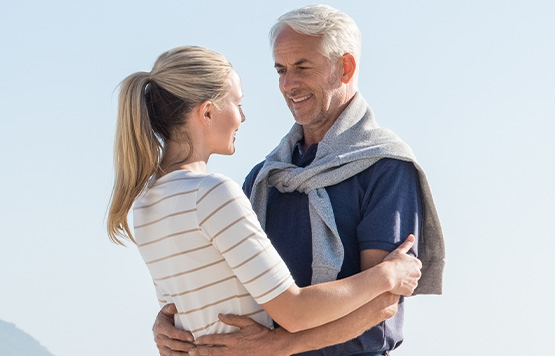We aren't guaranteed much as adults, but if there's one thing we can count on, it's that our bodies change as we get older. For men, that's especially true. One day you're lifting heavy weights and nailing your cardio regimen without having to stretch before or after. And then, in what seems like the blink of an eye, you start to slow down a little. You begin to notice aches and pains in places that weren't there before. You can't just go out for a night on the town, imbibe until your heart is content, and expect to wake up refreshed.
And while headaches and achy joints can be treated with ice and anti-inflammatory medicine, other aspects of aging aren't as easy to treat. You've probably guessed at this point what we're talking about: erectile dysfunction, or ED for short. When brought up to most men, those are two words that cause a guttural reaction of fear and trepidation.
While just about every man fears ED, millions suffer from it - almost 10% of the male population between the ages of 40 and 70. So, if you're beginning to have trouble performing in the heat of the moment, you're definitely not alone. You may be experiencing symptoms like:

Trouble Achieving an Erection

Trouble Maintaining an Erection

Lower Libido

Less Sexual Pleasure

Premature Ejaculation

Inability to Achieve Orgasm
However, at Elite Healthcare Physical Medicine, we understand that stats won't do anything to address the stress and anxiety you're facing in relation to erectile dysfunction. You need a viable solution - a science-backed treatment that doesn't require strange pills or invasive surgeries. As a fully integrated multidisciplinary clinic in Mount Pleasant, we have what you've been searching for: softwave therapy for ED in Wando, SC.

To fully grasp the benefits of using soft wave therapy for erectile dysfunction, you must first understand what causes ED to begin with. Put simply, erectile dysfunction is the inability to get an erection and keep it throughout sexual intercourse. You should know that it's not uncommon if you have erection trouble. However, if your inability to "get it up" becomes a common occurrence, you may be suffering from ED.
Erectile dysfunction doesn't just affect your penis - it also affects your wellbeing and relationships. It can lower your confidence, cause a large amount of stress that affects your ability to work, and may even cause contention with your partner.
You hear it all the time - as men get older, they often lose the ability to get erect. But why? As men age, the blood vessels in their penis start to fill up with micro-plaques, causing them to deteriorate. When these blood vessels deteriorate, it's more difficult for them to have steady blood flow. And that's the key to ED - having the constant blood flow to get and keep an erection. That's where the science-backed effectiveness of Softwave therapy swoops in to save the day.
Shockwave technology has been around for decades. It has been used at the highest-level research and medical facilities like the Cleveland Clinic and Memorial Sloan Kettering. However, Softwave therapy is a more refined, effective way to treat erectile dysfunction and also advance tissue healing.
Softwave therapy works by using electrohydraulic spark gap technology at its core. Its innovative design features a parabolic reflector applicator that produces very effective, low-intensity shock waves that are unfocused. Elite Healthcare Physical Medicine's Softwave applicator spreads energy to a large area of both superficial and deep tissue, creating a biological response that kickstarts your body's natural healing process.
For men suffering from ED, it is a revolutionary breakthrough treatment that doesn't require harmful surgeries or side effects from pills. In fact, it has been FDA approved for many uses, including improved blood flow, which is often the root cause of erectile dysfunction.
Book Appointment

Unlike some more traditional treatment options, Softwave therapy gets right to the crux of the ED issue. It uses shock wave technology on a cellular level, helping to naturally heal body parts, like the penis. Some of the most common benefits of Softwave therapy include:
Additionally, Softwave treatments don't require much prep, don't have any sketchy side effects, don't require any numbing agents or anesthesia, and result in little-to-no recovery time. Sound too good to be true? Contact Elite Healthcare Physical Medicine today to learn just how effective Softwave therapy is for our patients!

Softwave therapy works by using efficient, effective shock waves that cause biological regeneration processes that heal your body using its own healing factors. It works like this: Softwaves are created via a high-energy electrical discharge in water. The voltage is discharged between the plus and minus tips of an electrode. The spark gap or arching causes an equalization of voltage between the opposing tips of the electrode, which causes a hot plasma bubble. This bubble explodes and distributes in every direction, compresses the surrounding water, and generates a pressure > 10 MPa within nanoseconds.
To sum up, Softwave therapy uses low-intensity, unfocused energy that is delivered by a reflector in parallel waves. These waves help open up the blood vessels in your penis, allowing more blood to flow. At Elite Healthcare Physical Medicine, our team of expert physicians will develop a personalized Softwave therapy plan based on your body and needs. With the right number of treatments, you should be able to achieve and maintain firm erections as you did in your prime.

A Softwave therapy procedure averages 10-15 minutes but may be longer depending on treatment area and diagnosis. A gel is applied to the surface area to be treated. The applicator produces pulses as the clinician moves around the treatment area. During therapy, communication with your provider is necessary to identify treatment areas and monitor progress.
Once treatment is over, you may resume your normal day-to-day activities. In fact, most patients can have Softwave therapy while on their lunch break. You don't have to worry about recovery time, side effects, or any downtime at all.

More than 50% of men will experience erectile dysfunction at some point in their lives. If you're over the age of 30, have been suffering from ED, and don't want to rely on pills or surgery, Softwave therapy may be for you. That's doubly true if you've tried traditional treatments like Viagra and even surgery but didn't get the results you hoped for. Many academic studies about shockwave therapy for ED state that this revolutionary technology is successful where PDE5 inhibitors fail.
In fact, many urologists consider Softwave therapy the most promising ED treatment on the market. The truth is, even if you're not battling ED, men can use Softwave therapy as a preventative way to keep the magic flowing in the bedroom. Some of the key reasons to choose Softwave therapy over less effective, traditional treatments include:
If you're curious why Softwave treatments are so popular for ED, the answer is simple. Prescription drugs like Cialis and others that "treat" ED often come with less-that-savory side effects. At best, these effects are just something patients have to deal with. At worst, they can disrupt your day-to-day schedule and may prevent you from enjoying a healthy life. Sure, some men swear by the "little blue pill," but most guys aren't aware of the hidden risks with drugs like Viagra. The following side effects can be common in both short and long-term circumstances:
If you're suffering through erectile dysfunction, it's crucial to understand why it's happening. The primary reason for ED is a lack of blood flow to the penis, which makes erections difficult to get and keep. Rather than relying on prescription and gas station pills for a quick fix, more men are using softwave ED treatment in Wando, SC for an all-natural solution minus the side effects. With Softwave therapy, you don't have to live with ED, and you don't have to suffer from scary side effects from popping too many pills.
Book Appointment
Softwave therapy is often a more effective solution for men with ED than similar but less effective treatments using pressure waves. Softwave therapy from Elite Healthcare Physical Medicine uses acoustic pulses or unfocused shockwaves with fast and steep rise times and high positive pressure. Our unfocused wave design makes it possible to spread energy to a larger area, which affects deep and superficial tissue. By targeting a larger area, a more potent biological response is often achieved, initiating your body's natural healing factors.
By comparison, radial pressure waves use acoustic pneumatic pulses with low steeping effects, slow rise times, and large negative pressures. Radial waves are shallower than the shockwaves used in Softwave technology and focus energy and pressure at the surface of the applicator.
Here's a quick breakdown of the differences between softwave therapy for ED in Wando, SC, and radial pressure waves:

If you're new to the world of Softwave therapy, chances are you've got some lingering questions you need answered. We'll do our best to answer a few of those questions here for your convenience.
Q. Has the FDA approved softwave therapy for ED in cityname, state?
A. Yes - Softwave therapy is FDA 510(k) approved for:
Q. Is softwave therapy painful?
A. Softwave therapy does not require surgery or any invasive form of treatment. With that said, some patients describe minimal discomfort or pain during our softwave treatments. Should this occur, your medical specialist will make necessary adjustments. Usually, patients do not have to endure any pain at all and only experience a pulse or tapping feeling on their skin.
Q. How long is a Softwave treatment session?
A. An individual session only takes five to fifteen minutes. It's typically recommended that patients have treatment once a week for three to five weeks. The length and frequency of your Softwave therapy sessions will be determined after you visit our medical clinic for a comprehensive evaluation.
Q. How long does it take for Softwave therapy to work?
A. Every patient we treat is different, and as such, will have different treatment recommendations. Often, patients notice the results of Softwave therapy after the first session. However, for the longest-lasting effects, most patients need between three and four treatments, with a week of non-treatment after every session.
Q. Can I combine Softwave therapy with other treatments from Elite Healthcare Physical Medicine?
A. It's hard to give a definitive answer to this question since every patient is different. It's important for you to have a full evaluation to determine the scope of your needs and the appropriate therapies. However, Softwave therapy often works very well with other treatments. In fact, other therapies offered at our medical clinic like massage therapy and chiropractic care can make Softwave treatment even more effective.
Remember - our team at Elite Healthcare Physical Medicine is always happy to answer any questions you may have about ED or our ED treatments. Give us a call today - it would be our pleasure to get to know you better!
Unlike some wellness clinics, our experienced providers work together to optimize treatment for men suffering from ED. We always strive to make sexual wellbeing an accessible part of your everyday lifestyle.
That's why, at Elite Healthcare Physical Medicine, our mission is simple: to correct the root cause of your erectile dysfunction by taking a comprehensive, total body approach to healing and treatment. We want to address your ED problem without having to resort to chemical-based medications or unnecessary surgeries. Instead, we focus on all-natural, effective solutions like shockwave therapy for ED in Wando, SC.
By discovering what's best for each person's individual body and needs, we can help create a healthier future for those in our community through our holistic physical medicine practices. Contact our office to learn more about Softwave therapy and how we can solve the underlying causes of your unique ED situation.
Book AppointmentSouth Carolina Ports is marking the completion of its years-long infrastructure project as its fifteenth and final ship-to-shore crane is now operational at the Port of Charleston’s Wando Welch Terminal.The fifteen new ship-to-shore cranes have 155 feet of lift height and the ability to reach out over 22 containers to work the biggest ships calling the U.S. East Coast. The cranes will allow for three 14,000-TEU vessels to be worked simulta...
South Carolina Ports is marking the completion of its years-long infrastructure project as its fifteenth and final ship-to-shore crane is now operational at the Port of Charleston’s Wando Welch Terminal.
The fifteen new ship-to-shore cranes have 155 feet of lift height and the ability to reach out over 22 containers to work the biggest ships calling the U.S. East Coast. The cranes will allow for three 14,000-TEU vessels to be worked simultaneously—five cranes for each of the three berths. The first two neo-Panamax ship-to-shore cranes arrived at the Wando Welch Terminal in 2018.
The cranes are a key part of SC Ports’ $500 million investment to modernize Wando Welch Terminal. The multi-year project added capacity and boosted operations with new container-handling equipment, a modernized container yard and refrigerated cargo yard, improved traffic patterns and IT systems, a strengthened wharf, and an on-terminal transload facility for large retailers.
“It is truly remarkable to see the final crane of our new fleet moved into place on the Wando Welch Terminal wharf,” said SC Ports President and CEO Barbara Melvin, who took the helm in July. “This is the culmination of years of effort, planning and coordination by our team and project partners. Our modern equipment provides smarter operations and more fluidity for the supply chain.”
SC Ports handled 216,097 TEUs and 119,872 pier containers at Wando Welch Terminal, North Charleston Terminal and Leatherman Terminal in July. This marked an improvement from the 196,225 TEUs it handled the previous month as delays at the Port of Savannah led some operators to omit Charleston, opting to instead to unload Charleston-bound containers in Savannah to make up time, according to industry expert John McCown.
SC Ports last month reported a record fiscal year in 2022 (its fiscal year runs July to June), with 2.85 million TEUs handled. For pier containers, which account for boxes of any size, SC Ports moved 1.58 million containers during the year. Overall, SC Ports saw a 12% uptick in cargo, with more than 164,000 additional containers moving through the Port of Charleston than the year prior thanks to sustained consumer demand. Imports were up 22% year-over-year.
To maintain cargo fluidity at terminals, SC Ports has extended Sunday gate hours for motor carriers through at least peak season, given berth priority to vessels taking out more cargo, improved rail dray dwell times to around 36 hours, hired more than 150 people in operations to handle the influx of cargo, and launched a port-owned and port-operated chassis pool.
These efforts have helped to keep cargo moving. There have been no vessels waiting since early May, though supply chain challenges continue along the East Coast, according to SC Ports.
“We are continuing to be adaptive and responsive to ensure fluidity for our customers and cargo owners,” Melvin said.
Learn where South Carolina’s three top inshore species live and catch them all“You’re gonna have to horse him out of there. Don’t give him any slack,” said Capt. Addison Rupert of Charleston’s Lowcountry Outdoor Adventures, coaching a client who was hooked up with a bull redfish around some wooden structure in the Wando River. A few minutes later, Rupert hoisted the 42-inch redfish aboard, then asked his client if she was ready to go for the speckled trout and flounder. They were after an “i...
“You’re gonna have to horse him out of there. Don’t give him any slack,” said Capt. Addison Rupert of Charleston’s Lowcountry Outdoor Adventures, coaching a client who was hooked up with a bull redfish around some wooden structure in the Wando River. A few minutes later, Rupert hoisted the 42-inch redfish aboard, then asked his client if she was ready to go for the speckled trout and flounder. They were after an “inshore slam.”
Rupert said the Wando is one of many places in the Lowcountry where a fisherman has a chance to catch a slam this month: redfish, speckled trout and flounder.
“Redfish love to hang out along grass lines and in deep holes near wooden structures. Speckled trout like moving water, especially areas with cross currents. Flounder prefer smooth sandy or muddy bottom with structure nearby,” he said. “The Wando has all of these, and it has them all close together.”
A moving tide is preferable for all three species, said Rupert, but he said flounder bite on a slack tide more readily than redfish or trout, so he concentrates on those two species when the tide is moving, then targets flounder at ebb tide.
This month, redfish are all over the Lowcountry, and they are feeding aggressively. Rupert targets them with live or cut bait.
“I know I’ll find some redfish near wooden structures, especially ones that are near deep holes, and the Wando is full of such structures,” said Rupert, who fishes with live mud minnows on jigheads, and with cut blue crabs. With a quarter of a crab threaded onto a 3/0 circle hook at the end of a Carolina rig, Rupert anchors down or ties up within casting distance of docks or old bridge pilings. He fan-casts a spread of several rods — some with blue crab and some with mud minnows — then waits for a bite.
If nothing bites in 15 or 20 minutes, Rupert moves, but sometimes it’s a very subtle move.
“Sometimes I’ll just move a few feet so I can reach another side of whatever structure I’m fishing. Other times, I’ll run downriver to another piece of structure,” he said.
When it’s time for trout, Rupert focuses on moving water. Points on the main river often feature different currents that collide, and Rupert targets them with popping corks and mud minnows. He casts into one current, lets the current carry the cork into the other, then reels the rig back in, making it pop all the way back, often drawing strikes from trout.
When using popping corks, Rupert likes to have an 18-inch leader under the cork; he said many anglers are too shy when it comes to popping the rigs.
“I want it moving the whole time. I let it settle, then pop it across the water. The trout come to check out the noise, see the bait, then hopefully bite it,” he said.
Flounder, Rupert said, are the most challenging of the three inshore slam species.
“They are more particular about where they hang out, and they are finicky biters compared to redfish and trout, especially this month when those two species are pretty aggressive,” he said.
But the Wando has plenty of spots where flounder like to gather, said Rupert, who looks for shallow water with a smooth bottom. A black, muddy bottom is good, but a white sandy one is just as good. He uses a Carolina rig with a 12- to 18-inch leader and a mud minnow for bait. He sticks with 12- to 15-pound test line and suggests casting the minnow out, then slowly working it back toward the boat. He cautions anglers not to set the hook too quickly.
“If they run away with it, then you need to set the hook right away, but if you just feel a slight tick, just be patient and let the fish take it in. Flounder don’t bite like other fish; they take longer to work the bait into their mouths,” Rupert said.
In the Wando, Rupert said it’s easy to find flounder spots. Some are between the docks of riverfront homes. Look for areas that have very gentle slopes from shore to deeper water. At low tide, some of this water is inches deep, even 30 or 40 feet from the shore. It’s flat and sandy, a welcome habitat for flounder. He finds other flounder spots with flat, muddy bottoms where undeveloped land meets the river, mostly along the left bank of the river heading upstream from Remley’s Point.
Rupert said other inshore slam hot spots this month include creeks around the Isle of Palms Marina and the grass-lined banks in the harbor out of Shem Creek’s public boat ramp.
Another Charleston-area guide, Capt. Amy Little of Fine Lines Charters, likes pursuing the inshore slam, often out of the Breach Inlet boat ramp on Isle of Palms. Many of her favorite redfish and trout holes are within sight of the ramp and include some of the old wooden pilings near private docks. She likes to tie up or anchor within casting distance of these structures, then uses corks to suspend her bait above the bottom. She also likes to target grass lines, especially ones with shell banks nearby.
“When I see a grass line near a shell bank, then notice a jut in the grass line that creates a hole or opening in the grass, I will give that area special attention. I expect to catch redfish tight to the grass there, and trout are usually hanging out just off the grass, between the grass and shell bank,” Little said.
When fishing these shell banks, Little almost exclusively uses corks, suspending her bait with 12- to 15-inch leaders.
“You want to keep your hooks off those shell banks to keep from getting hooked on the shells. The trout sometimes bite very lightly too, so the cork helps detect bites,” said Little, who doesn’t impart a lot of action into the popping corks when her bait — usually live mud minnows or live shrimp — is fresh. “Once the bait gets a little sluggish, I’ll start popping it some, but I usually let the bait do its own thing.”
Aside from areas around Breach Inlet, Little said the waters around the Pitt Street bridge are productive for the inshore slam.
“The bull redfish hang out along the pilings of the bridge, and the grass lines all around the bridge are good spots for redfish and trout,” she said. “Water flows under the bridge to the main waterway, and the bottom there is a combination of shell banks and smooth sand. Anchoring in one spot can be productive for all three inshore slam species.”
Castle Pinckney is another productive spot for Little. Letting her cork float along with the tide on the outskirts of the island is a good tactic for trout, but she also catches flounder on the bottom between the island and a nearby cluster of pilings. She said flatfish love hugging the bottom close to the rocks that line the island, looking for an easy meal to ambush.
“They like a flat bottom, but they like it even better if it’s near some sort of change in structure like rock piles or even shell banks,” she said.
Aside from live mud minnows, Little likes using artificial lures for redfish and flounder, especially soft plastics like Vudu Shrimp.
“These baits are really good. They work well and they stand up to abuse. You can catch dozens of redfish and trout on one of these without them tearing up,” said Little.
Like Rupert, Little prefers a moving tide for this type of fishing,and said the incoming is almost always best.
“At low tide, these fish are ready to move into the areas they haven’t had access to in several hours. They know food is waiting for them, and once the tide starts rising, these fish will come in and hit the shell banks, grass lines, and dock pilings to look for food that is only available on the incoming or high tide,” she said.
DESTINATION INFORMATION
HOW TO GET THERE/WHEN TO GO — The Charleston area is blessed with dozens of public boat ramps that allow great access to productive waters like the Wando River. The Remley Point ramp is on the Cooper River at the foot of the US 17 bridge in Mount Pleasant; it is close to the mouth of the Wando River. The Paradise Island landing is on CR 1453 off US 17 on the Wando. The Breech Inlet ramp is a pay ramp at Isle of Palms Marina. June is a great month to target an inshore slam because flounder and trout have arrived, and along with redfish, they are very active before water temperatures warm to true summer levels.
TACKLE/TECHNIQUES — Medium-action spinning or baitcasting tackle will get the job done on trout, reds and flounder. Carolina rigs are most-often used when targeting flounder using live bait. For trout, a live bait suspended under a popping cork can do the trick. Reds will also hit live bait on a jighead or under a cork, or crab chunks on a Carolina rig.
GUIDES/FISHING INFO — Capt. Addison Rupert, Lowcountry Outdoor Adventures, 843-557-3476, www.lowcountryoutdooradventures.com; Capt. Amy Little, Fine Lines Charters, 843-345-1310, www.finelinescharters.com; Haddrell’s Point Tackle, Mount Pleasant, 843-881-3644; Charleston Angler, Mount Pleasant, 843-884-2095; Isle of Palms Marina, Isle of Palms, 843-886-0209; Atlantic Game & Tackle, Mount Pleasant, 843-881-6900; Henry’s Sporting Goods, Mount Pleasant, 843-881-0465. See also Guides & Charters in Classifieds.
ACCOMMODATIONS — Hampton Inn & Suites, Mount Pleasant, 843-856-3900; Holiday Inn, Mount Pleasant, 843-884-6000; Seaside Inn, Isle of Palms, 888-999-6516; Charleston Harbor Resort and Marina, Mount Pleasant, 888-856-0028; Shem Creek Inn, Mount Pleasant, 843-881-1000.
MAPS — Capt. Segull’s Nautical Charts, 888-473-4855, www.captainsegullcharts.com; Sealake Fishing; Guides, 800-411-0185, www.thegoodspots.com; Maps Unique, 910-458-9923, www.mapsunique.com.
CHARLESTON, S.C. (WCIV) — The S.C. Dept. of Transportation says temporary repairs on a broken support cable will require the James B. Edwards Bridge on I-526 westbound over the Wando River to be closed four weeks for repairs.The DOT says it is targeting June 11 for a reopening date for the bridge, which connects Mount Pleasant to Daniel Island. The bridge and the portion of I-526 west from exits 28 to 24 were closed Monday, May 14, after DOT engineers say they found the broken cable.Repairs the DOT will be making to get t...
CHARLESTON, S.C. (WCIV) — The S.C. Dept. of Transportation says temporary repairs on a broken support cable will require the James B. Edwards Bridge on I-526 westbound over the Wando River to be closed four weeks for repairs.
The DOT says it is targeting June 11 for a reopening date for the bridge, which connects Mount Pleasant to Daniel Island. The bridge and the portion of I-526 west from exits 28 to 24 were closed Monday, May 14, after DOT engineers say they found the broken cable.
Repairs the DOT will be making to get the bridge reopened by June 11 will be temporary, according to DOT officials, who did not go into detail about the outlook for long-term repairs and the need for additional future closures.
DOT Secretary Christy Hall said during Wednesday's press conference that the cable rupture constituted a "life safety" issue, leading DOT to shut down the bridge hours after a review was performed by safety inspectors.
According to a spokesman for FIGG Bridge Group, the engineering firm that designed the bridge, one cable, or tendon, rupturing wouldn't compromise the safety of the bridge. The bridge features 92 high-tension support tendons within its structure, officials say.
Each tendon consists of a bundle of seven smaller 19-strand steel cables encased in concrete grout, according to DOT chief engineer Leland Colvin. DOT also says the ruptured cable is one of eight main support cables that run underneath the length of the bridge span.
Meanwhile, there are 84 additional support tendons embedded in the concrete foundation segments of the bridge. ABC News 4 has reached out to a FIGG spokesperson for clarification on why DOT officials say a "main" cable rupturing presents a threat to life, while FIGG experts have said a single cable rupturing wouldn't compromise safety.
Meanwhile, two of the 84 support cables in the bridge structure also have been identified as problematic, with one needing to be replaced, according to Colvin. DOT says it still has not pinpointed an exact cause for the main tendon rupturing, or the damage to the other tendons.
DOT officials said prior to Wednesday's announcement they'd found evidence of water intrusion and corrosion in the inner workings of the westbound portion of the bridge. Inspectors haven't identified a cause for those problems, but say they're isolated to the westbound side of the bridge, not the eastbound.
Colvin did stress Wednesday that the DOT believes a "design" issue is contributing to the cable damage, not load stress from heavy traffic on the bridges.
DOT had been doing weekly inspections on the bridge since 2016, when a separate "main" cable on the westbound side of the bridge was found with damage. That cable was repaired by early 2017.
Previously, the bridge had only been subject to inspections every 2 years, as federally mandated. According to DOT, there was no evidence in any of the the most recent weekly or yearly inspections of an impending cable break.
Colvin says DOT has now started daily site visits at the James B. Edwards Bridge that include both inspections and testing of the cable system on both the eastbound and westbound sides of the bridge.
Original construction on the bridge began in the late 1980s, and it opened to traffic in 1991, meaning the ruptured cable had been in service roughly 30 years. Colvin says the life expectancy on the cables at the time they were installed was 50 years.
Hall says she has ordered a complete review of the bridge's maintenance records related to the Wando bridge in order to put together a timeline and history of potentially overlooked issues in the past. Hall says that information will be released to the public.
"We have nothing to hide on this. We’re all in this together," Hall said.
Detours are in place along Highway 17 south to I-26, and Highway 17 north to S.C. 41 and Clements Ferry Road. Charleston mayor John Tecklenburg has urged carpooling, and said the city has entered into licensing agreements to expand ferry services for people commuting from Daniel Island and Mount Pleasant.
This is a developing story and will be updated.
Twenty-one mooring balls were recently installed and are visible from the two waterfront piers on Daniel Island’s Wando River coastline. The devices were permitted and funded by the Daniel Island Yacht ClubAccording to club representative Jeff Jarrard, a total of 144 mooring balls have been approved by the Army Corps of Engineers, SC Department of Health and Environmental Control and Ocean Resource Management.Mooring balls are used to safely secure a vessel for a temporary stay.The mooring balls off of Waterfront P...
Twenty-one mooring balls were recently installed and are visible from the two waterfront piers on Daniel Island’s Wando River coastline. The devices were permitted and funded by the Daniel Island Yacht Club
According to club representative Jeff Jarrard, a total of 144 mooring balls have been approved by the Army Corps of Engineers, SC Department of Health and Environmental Control and Ocean Resource Management.
Mooring balls are used to safely secure a vessel for a temporary stay.
The mooring balls off of Waterfront Park consist of a helical anchor that is driven into the seabed and attached to an elastic rope, known as a pennant.
These are not the mooring balls of old that were configured with a slab of concrete and a chain. The rope on modern mooring balls, like the ones installed off of Daniel Island, is flexible and stretches during tidal changes or storm surges.
Jarrard explained that the system is designed so as not to disrupt sea life or the ecosystem. He further noted that the balls do not impede the navigable waters because all of the moorings are located inside the channel.
The plan is to install a total of 73 mooring balls, Jarrard said, which is about half of the approved amount. Twenty-one out of a planned 28 have been installed north of the piers and another 45 are expected to be installed south of the piers, Jarrard said.
There are three types of moorings available: One that can sustain up to a 25-foot boat, one up to 35 feet and another up to 45 feet. Mooring balls for the smaller vessels will be closer to shore for depth reasons.
Although the mooring balls are engineered to have vessels attached during storm events, Jarrard said that the Daniel Island Yacht Club’s policy is that vessels cannot be moored during a storm.
Hazelett Marine is in charge of installation. Currently stationed in Panama, Hazelett is expected to return in two to three weeks to finish the remainder of the mooring field.
When the operation is complete, there will be two mooring fields and a main channel in and out of the facility between the two docks. The North Dock will be home to the Daniel Island Yacht Club and the Daniel Island Ferry. The South Dock is where the Carefree Boat Club resides, offering day docking and by the hour.
On the North Dock, there will be public restrooms and an administrative office for booking and launching charters and cocktail cruises. Construction has been delayed due to material supply issues but should be completed in the next few months.
There are currently no bridals or pendants on the mooring balls, rendering them unusable. Future usage will be permitted only for DI Yacht Club members or sponsored guests on a monthly or annual basis.
The Daniel Island Yacht Club has not opened up its membership yet. Its sailing program will be full steam ahead by the spring of 2022. Food and beverage services on the North Dock will be ready by early summer of 2022.
“Starting a yacht club is a different animal,” Jarrard said. “It takes a lot of preparation and discussion ... It’s a process ... We’re going to take our time and do it right.”
With this year’s opening of the first U.S. greenfield container terminal in more than a decade plus significant modernization of its venerable Wando Welch Terminal, the South Carolina Ports Authority’s Port of Charleston is exceptionally positioned to fluidly move burgeoning volumes on and off megacontainerships.“As the only port in the country with new terminal capacity, SC Ports has the ability to handle the growing cargo volumes and rising retail imports coming through the Port of Charleston,” James I. &ldqu...
With this year’s opening of the first U.S. greenfield container terminal in more than a decade plus significant modernization of its venerable Wando Welch Terminal, the South Carolina Ports Authority’s Port of Charleston is exceptionally positioned to fluidly move burgeoning volumes on and off megacontainerships.
“As the only port in the country with new terminal capacity, SC Ports has the ability to handle the growing cargo volumes and rising retail imports coming through the Port of Charleston,” James I. “Jim” Newsome III, president and chief executive officer of the South Carolina authority, told AJOT.
In his dozen years at the SC Ports helm, Newsome, a former Hapag-Lloyd (America) Inc. president, has spearheaded delivery of what he termed “just-in-the-nick-of-time infrastructure,” including through an ambitious six-year, $2 billion initiative that augurs to boost the Port of Charleston’s total annual throughput capacity to more than 4.8 million 20-foot-equivalent units.
The Port of Charleston’s increased big-ship-handling capability is coming at a propitious time, amidst a pandemic-spurred increase in U.S. consumer spending and concomitant import boom and heightened distribution hub capacity demand.
“Amid ongoing supply chain challenges, SC Ports’ capacity, berth availability and efficient operations are more important than ever,” Newsome said.
Operations were launched in March at the first phase of Hugh K. Leatherman Terminal, built on a former U.S. Navy base site in North Charleston, where the port permitting process began back in 2003. The initial Leatherman phase is adding 700,000 TEUs of yearly capacity at the Port of Charleston. At full build-out, a three-berth Leatherman facility is to offer 2.4 million TEUs of annual throughput capability.
A similar 2.4 million TEUs of yearly capacity is to be provided by the modernized Wando Welch Terminal, a four-decades-old facility that, in this latest $500 million renovation, is seeing its contingent of ship-to-shore cranes increase to 15 units with 155 feet of lift height, augmented by 65 rubber-tired gantries and a stronger wharf. The last two of those cranes are slated to be operational by early 2022. The Wando Welch Terminal can simultaneously handle as many as four megacontainerships, each with a capacity of 14,000 or more TEUs.
Furthermore, the nearly $600 million Charleston Harbor Deepening Project, funded by state and federal dollars, is on track to achieve a 52-foot depth in 2022, to give Charleston the deepest harbor on the U.S. East Coast, capable of accommodating the biggest of boxships at any time under any tidal conditions.
“All of this puts us in a very unique situation to be able to grow without congestion,” Newsome said. “We have no congestion right now. The port works very reliably, and we are able to get ships in and out fast.”
SC Ports already has been handling record volumes. In the first eight months of calendar 2021, the Port of Charleston handled 1,814,602 TEUs, putting it on pace to far exceed the 2,309,995 TEUs moved in 2020 and also surpass the calendar-year record 2,436,184 TEUs handled in 2019.
With such a dramatic rise in activity, SC Ports also is enhancing its intermodal capabilities for getting cargo to and from inland destinations.
Supported in part by a $25 million U.S. Department of Transportation grant, expansion is under way at SC Ports’ Inland Port Greer, the first phase of which opened just off Interstate 85 in Upstate South Carolina in 2013, with BMW Manufacturing Co. as its launch customer. The Greer facility extends the Port of Charleston’s reach 212 miles inland via Norfolk Southern rail, with 94 million consumers reachable within a one-day truck trip from the inland terminal.
Meanwhile, SC Ports is developing the Navy Base Intermodal Facility, a cargo yard near Leatherman Terminal that is to be served by both CSX and Norfolk Southern. That facility, targeted for completion within three years, is part of a $500 million-plus project that also encompasses an inner harbor container-on-barge operation for moving boxes between Wando Welch Terminal and Hugh K. Leatherman Terminal.
At the same time, with the continuing boom in retail imports, SC Ports is actively working with retailers to find transload and warehouse capacity to expedite peak-season volumes. SC Ports operates a transload facility at Wando Welch Terminal, handling cargo for e-commerce business of megaretailers.
A 3-million-square-foot Walmart import distribution center is on schedule to open in January on port-owned land in Ridgeville, South Carolina, about 35 miles northwestward up Interstate 26 from the Leatherman terminal.
For more than a quarter of a century, Paul Scott Abbott has been writing and shooting images for the American Journal of Transportation, applying four decades of experience as an award-winning journalist. A graduate of Northwestern University’s Medill School of Journalism, with a master’s magna cum laude from Trinity Evangelical Divinity School, Abbott has served as president of chapters of the Propeller Club of the United States, Florida Public Relations Association and Society of Professional Journalists. Abbott honed his skills on several daily newspapers, including The Cincinnati Enquirer, The Richmond (Va.) News Leader, Albuquerque Journal and (South Florida) Sun-Sentinel, and was editor and publisher of The County Line, a weekly newspaper he founded in suburban Richmond, Va. A native Chicagoan, he is a member of American Mensa and an ever-optimistic fan of the Chicago Cubs.
